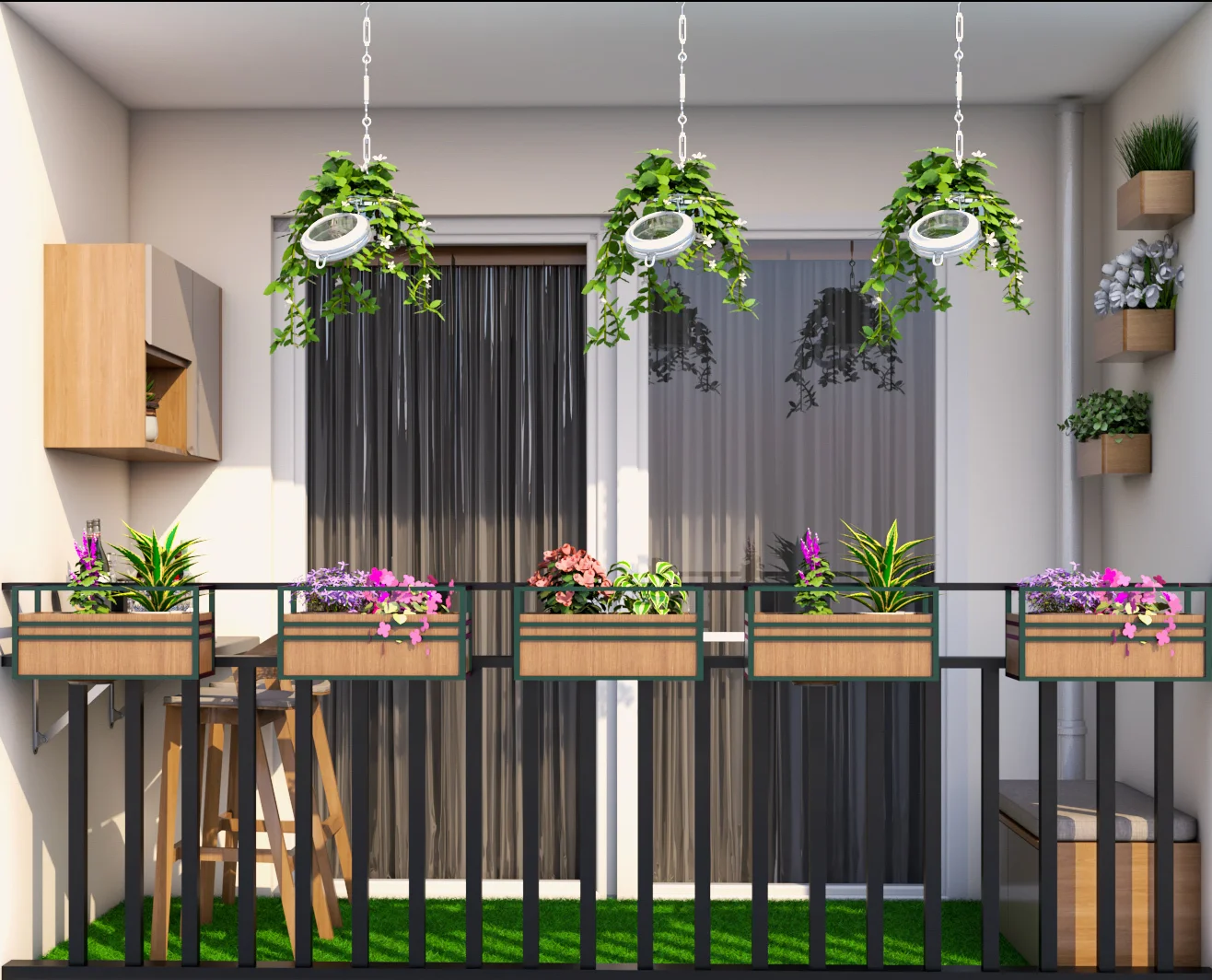Balconies are often seen as small outdoor sanctuaries, a place where we can relax, enjoy a cup of coffee, or soak in the fresh air. But as urban spaces grow and sustainability becomes more important, it’s crucial to ensure that even our balconies are designed with the environment in mind. At WeDezine, we understand that sustainable interior design doesn’t stop at your living room—it extends to every corner of your home, including the balcony.
In this blog, we’ll share practical tips on how to incorporate sustainable practices into your balcony design, so you can create an eco-friendly, stylish, and functional space.
1. Choose Eco-Friendly Materials
Sustainable design starts with choosing the right materials. When selecting furniture and décor for your balcony, look for options made from natural, recyclable, or upcycled materials.
- Wood: Opt for sustainably sourced wood, such as bamboo or reclaimed wood, for furniture and flooring. These materials are renewable and have a lower environmental impact compared to traditional hardwood.
- Recycled Metal or Plastic: Consider furniture made from recycled metals or plastics, which help reduce waste.
- Natural Fabrics: Look for cushions, throw blankets, and curtains made from organic cotton, linen, or hemp.
2. Incorporate Greenery
One of the easiest ways to make your balcony more sustainable is by incorporating plants. Not only do plants improve air quality, but they also add beauty and tranquility to your space.
- Vertical Gardens: If space is limited, consider installing a vertical garden. Use recycled containers or plant pots to create a lush wall of greenery without taking up too much space.
- Native Plants: Choose plants that are native to your region. These plants are adapted to the local climate, require less water, and attract local wildlife, enhancing the overall ecosystem.
3. Opt for Solar-Powered Lighting
Lighting is an essential part of any outdoor design, but traditional lighting can consume a lot of energy. Solar-powered lights are a fantastic, eco-friendly alternative. They absorb sunlight during the day and automatically light up at night, making them an energy-efficient and cost-effective solution.
- Solar Lanterns and String Lights: These create a warm and inviting atmosphere while reducing your carbon footprint.
- Solar Garden Lights: Perfect for illuminating your plants or creating a cozy vibe without using electricity.
4. Install Water-Saving Features
Water conservation is a key element of sustainable living. There are several ways to reduce water usage on your balcony while maintaining its beauty.
- Rainwater Harvesting: Set up a small rainwater harvesting system to collect water, which you can later use to water your plants.
- Water-Efficient Planters: Choose self-watering planters or those designed with efficient drainage systems. These help you minimize water wastage by ensuring plants get just the right amount of water.
5. Repurpose and Upcycle
Repurposing and upcycling old items is a great way to add character to your balcony while keeping things sustainable. Look for furniture, containers, or décor pieces that can be given a second life.
- Upcycled Furniture: Turn an old wooden crate into a side table, or refurbish old chairs with eco-friendly paints.
- Repurposed Containers: Use glass jars, tin cans, or wooden boxes as plant pots to give them new life.
6. Create a Zero-Waste Space
A zero-waste balcony can be a fun and rewarding project. Focus on reducing waste by choosing reusable, compostable, or biodegradable items.
- Compost Bin: If you have space, create a small compost bin to dispose of organic waste like plant clippings, which can later be used to fertilize your plants.
- Reusable Materials: Instead of disposable plastics, use materials like bamboo or metal for planters, garden tools, and even furniture.
7. Maximize Natural Ventilation
Rather than relying on fans or air conditioning, incorporate design features that maximize natural ventilation.
- Cross Ventilation: Arrange furniture and plants in a way that promotes airflow and helps cool the space naturally.
- Lattice Screens or Shutters: Install these to allow air to flow freely while providing shade from the sun. These materials are often made from eco-friendly options like bamboo or reclaimed wood.
8. Keep it Minimal
Sometimes, the simplest approach is the most sustainable. When designing your balcony, avoid overcrowding the space with too many items. Stick to a minimalist design by selecting only the essentials, ensuring each piece serves a functional or aesthetic purpose. This helps reduce the consumption of unnecessary resources and promotes a calmer, more eco-friendly environment.
9. Support Local and Ethical Brands
When purchasing furniture, décor, or plants, support local artisans and ethical brands that prioritize sustainable production methods. This reduces carbon footprints associated with transportation and ensures that workers are paid fairly. Look for companies that share their sustainability practices, such as using eco-friendly packaging and ensuring fair working conditions.
10. Choose Low-Maintenance Designs
Designing a low-maintenance balcony not only saves you time and effort but also reduces the need for excessive cleaning products, water, and energy. Choose durable and easy-to-care-for furniture and accessories that don’t require frequent replacements.
- Weather-Resistant Materials: Invest in weather-resistant furniture and outdoor textiles that can withstand Bangalore’s varying climate without needing constant upkeep.
Conclusion
By adopting these sustainable practices, you can transform your balcony into an eco-friendly, stylish retreat that supports both your lifestyle and the planet. Whether it’s choosing environmentally responsible materials, adding green plants, or opting for energy-efficient lighting, every little change counts in creating a more sustainable living space.
At WeDezine, we believe in thoughtful, sustainable design that not only looks beautiful but also contributes to a healthier planet. Embrace sustainability in your balcony design today, and enjoy a peaceful, eco-conscious space that you can be proud of!


